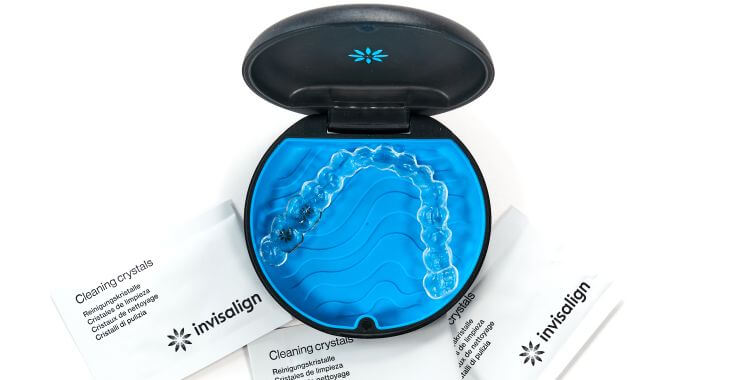How to Fix Overbite Teeth for a Beautiful Smile

Your teeth are meant to be functional for chewing and supporting your facial structure, but they are also part of your appearance. When teeth are misaligned, they may not function the way they should or look their best. One type of misalignment is an overbite. Teeth with an overbite can result in some functional and health issues, as well as impact the aesthetics of your smile. What are the symptoms of an overbite and how can you correct this problem? Here is what you need to know.
What Is an Overbite?
When teeth on the upper and lower jaws align correctly, the top teeth should slightly overlap the bottom teeth. However, if the upper teeth overlap the bottom teeth by 2-3 mm or more, it is considered an overbite. There are different degrees of overbites, from minor to severe. Overbite teeth can be caused by skeletal problems during development that are genetic or from overcrowding of the teeth. An overbite can be caused by external issues, such as children who use a bottle or pacifier too long or chew on their nails or other items.
When an overbite is present, it can change the appearance of the teeth and smile. It also can affect the health and function of the teeth. Some of the problems associated with an overbite include:
- Speech impediments
- Difficulty performing adequate oral hygiene
- Facial or jaw pain
- Overcrowded teeth
- Tooth decay, gum disease and eventual tooth loss
Malocclusions like overbites can have long-term effects on your oral and overall health. Correcting overbite teeth problems can improve your oral health and the appearance of your smile. Depending on the severity of your overbite, you may be able to receive treatment for your overbite at your dentist’s office or you may require the help of an orthodontist.
How to Fix an Overbite
To determine how to fix an overbite, first a thorough dental or orthodontic exam must be performed. Mild to moderate overbites are usually dental problems, including overcrowding and development issues with the teeth. For more severe overbites, the overlying cause may be skeletal and require more advanced treatment options. A normal overbite is a less than 3 mm gap of the upper teeth over the bottom teeth. A deep overbite is 4-8 mm and likely will need orthodontic treatment and anything over 9 mm is a severe overbite that does require treatment.
Most people are familiar with orthodontic devices. Orthodontics are used to shift misaligned teeth into place and can fix problems like an overbite, underbite or crossbite, as well as straighten teeth. For normal and deep overbites, orthodontic devices and treatments can be effective in realigning teeth and the bite to create a healthy and beautiful smile. Severe overbites may require surgery and the help of orthodontic devices. Here are the available treatments and how to fix an overbite.
- Braces for Overbites
- Braces in some form have been used for over a century. Metal braces are the most common, which adhere brackets to the front of the teeth that are connected by wires. By adjusting the tightness of the wires, teeth can be shifted into the desired position during treatment. Most patients wear braces from 1-2 years, then a retainer to maintain their teeth alignment. Braces also can come in ceramic and clear options for more discreet orthodontic treatment.
- Clear Plastic Aligners
- Clear plastic aligners like Invisalign® and other brands use a similar method as braces to fix misaligned teeth. The plastic aligners are customized to fit over the teeth and apply gentle pressure to the teeth toward the desired position. New aligner trays are issued every few weeks during treatment to bring the teeth closer to the correct position.
- Oral Surgery
- In severe cases, surgery may be required to remove crowded teeth or change the bone structure in the jaw to address a substantial overbite. Oral surgery will not fix the overbite, but it can be used in conjunction with aligners or braces to correct severe overbites.

An orthodontist or dentist can determine the level of treatment needed and how to fix an overbite. It is easier to fix an overbite when the teeth are still developing and growing, which is why orthodontic treatment is typically started in adolescent or teenage years. However, even adults can benefit from orthodontic treatment for an overbite to correct their alignment for a healthier and more attractive smile.
Overbite teeth problems are the most common type of misalignment. If you or your child has an overbite, there are effective options to shift teeth into place for better oral health and a straight, gorgeous smile. Visit your local dentist or orthodontist to learn how to fix overbite teeth for a beautiful smile – it is worth the investment to improve your oral function and smile appearance.
Frequently Asked Questions
Can adults fix their overbite teeth?
Yes, adults can fix their overbite teeth. In fact, many adults choose to get braces or Invisalign to correct their overbite teeth to improve their smile and dental health. However, it’s important to discuss treatment options with a qualified orthodontist to determine the best course of action for your individual needs.
Are there any risks associated with fixing an overbite?
Like any dental procedure, there are some risks associated with fixing an overbite. These can include tooth decay, gum disease, and temporary or permanent damage to the teeth or gums. However, with proper care and maintenance, these risks can be minimized.
Is fixing an overbite painful?
Some discomfort and soreness may occur after getting braces or Invisalign, but this is typically mild and can be managed with over-the-counter pain medication. Surgery to correct an overbite may cause more discomfort and pain, but this can be managed with prescription pain medication.
How long does it take to fix an overbite?
The length of time it takes to fix an overbite depends on the severity of the overbite and the chosen treatment option. Mild to moderate overbites can often be corrected within a year or two with braces or Invisalign. More severe overbites may require longer treatment times or even surgery.
The information provided on this website, including text, graphics, images, and other materials, is intended solely for informational purposes and should not be used as a substitute for professional medical advice, diagnosis, or treatment.



)